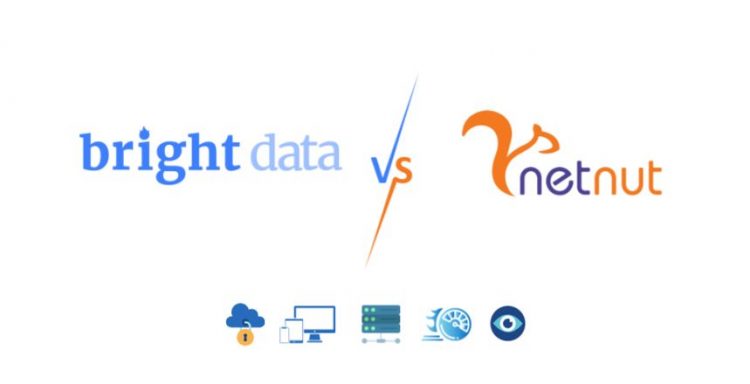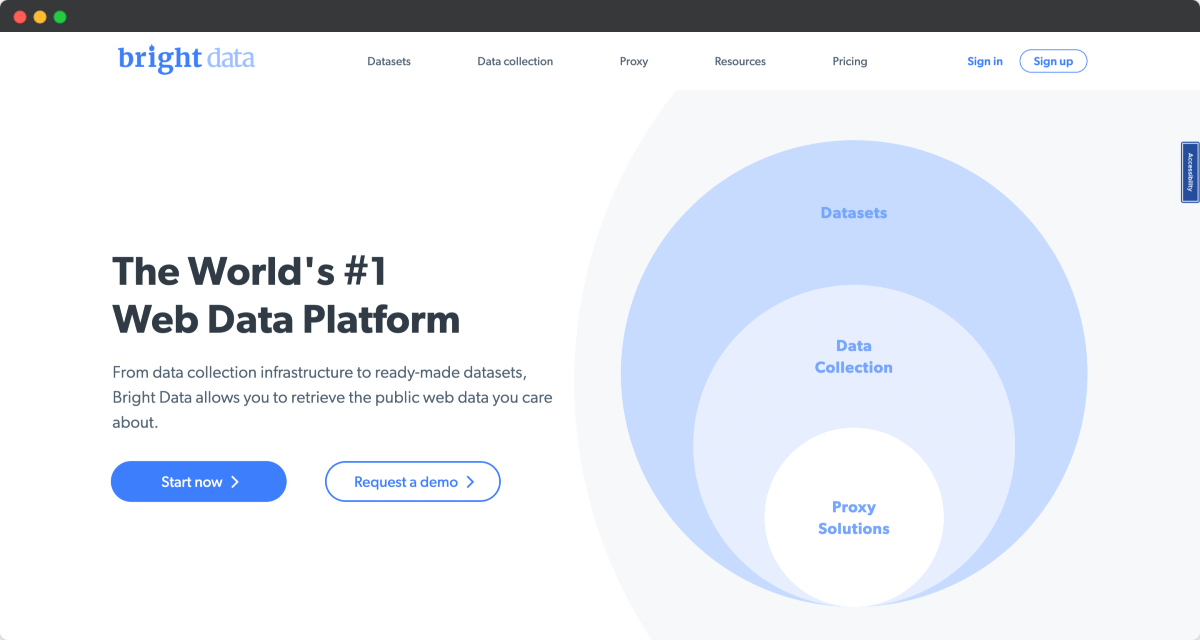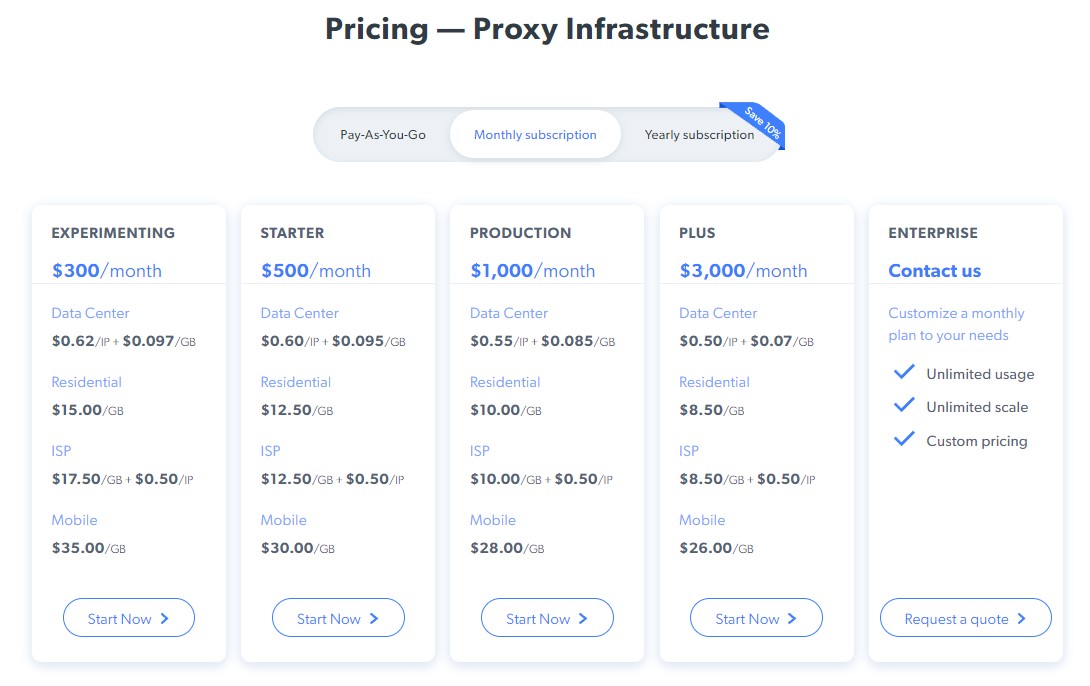If you run a business online or need to collect data from websites, you’ve probably heard about proxy services. They help you stay anonymous, avoid blocks, and access data without restrictions. Two popular names people often compare are Bright Data and NetNut.
Both offer powerful proxy networks, but they work a little differently and are made for different kinds of users. Knowing which one to pick can save you a lot of time, money, and trouble.
Here’s a quick fact to show you how big this market is getting: the global proxy network market is expected to reach $9.5 billion by 2030, which means more businesses are using proxies than ever before.
In this article, we’ll put Bright Data and NetNut side by side and compare their features, speed, pricing, support, and everything else you need to know before choosing one.
Let’s get started.
Bright Data Overview
Bright Data is one of the most well-known proxy service providers in the world. It started back in 2014 and has grown fast because of its huge proxy network and reliable service. Many big companies, marketers, and developers use Bright Data for things like web scraping, ad verification, SEO monitoring, price tracking, and market research.
The best thing about Bright Data is the number of proxy types it offers. You get:
- Residential proxies — real IP addresses from real people’s devices
- Mobile proxies — IPs from mobile devices
- Datacenter proxies — fast and cheap, great for simple tasks
- ISP proxies — IPs that come directly from internet service providers, with fast speeds and long sessions
It’s known for having one of the largest proxy networks, with over 72 million IPs across 195+ countries. This makes it easy to target any location you need.
Bright Data also gives users a lot of control. You can rotate IPs, manage sessions, and target by country, city, ASN, or even carrier. Plus, it offers helpful tools like a Proxy Manager, browser extension, and APIs, making it beginner-friendly while still powerful enough for big projects.
NetNut Overview
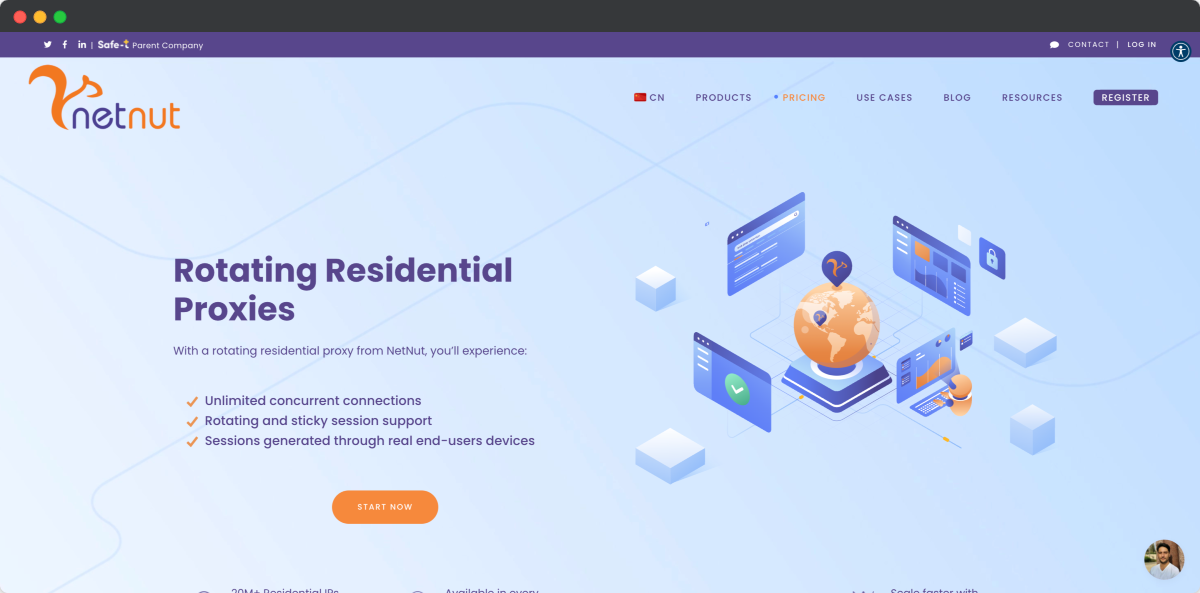
NetNut is another strong player in the proxy world, but it’s a bit different from Bright Data. It focuses on providing fast, stable residential proxies by using direct ISP connectivity. This means the IPs come directly from internet service providers, rather than from users’ devices, which can lead to more consistent and reliable performance.
NetNut offers:
- Residential proxies — real IPs from people’s homes
- Mobile proxies — IPs from mobile devices
- Datacenter proxies — great for high-speed needs, like scraping
One of the key selling points of NetNut is its reliable and stable connections. Since it doesn’t rely on end-user devices, you’re less likely to deal with issues like IP blocks or slow speeds. This makes NetNut a solid choice for businesses that need smooth, uninterrupted proxy performance.
The network isn’t as big as Bright Data’s, but it still has millions of residential IPs in over 100 countries, which should be enough for most tasks. It also offers helpful tools like a user-friendly dashboard, API access, and a proxy manager for easy integration.
Features Comparison
When it comes to proxies, performance and speed are two of the most important factors to consider. After all, a slow or unreliable proxy can ruin your entire project. Whether you’re scraping data, running ads, or doing market research, you need proxies that work quickly and smoothly.
In this section, we’ll dive into how Bright Data and NetNut perform in the real world. We’ll look at things like speed, consistency, downtime, and how each service handles heavy tasks like web scraping or ad verification.
Let’s see which one comes out on top when it comes to keeping things fast and reliable.
| Feature | Bright Data | NetNut |
|---|---|---|
| Proxy Network Size | 72+ million IPs across 195+ countries | Millions of IPs in over 100 countries |
| Proxy Types | Residential, Mobile, Datacenter, ISP | Residential, Mobile, Datacenter |
| IP Rotation Options | Yes, flexible IP rotation | Yes, automatic rotation |
| Session Control | Yes, manual or automatic session control | Yes, with customizable session times |
| Speed & Latency | High speeds, but varies by location | Generally faster with stable connections |
| API Access | Yes, full API access for developers | Yes, developer-friendly API |
| Browser Extensions/Tools | Proxy Manager, Browser Extension, SDKs | Proxy Manager, API |
| Targeting Capabilities | Country, City, ASN, Carrier | Country, City, ASN, Carrier |
| Compliance & Security | GDPR & CCPA compliant, ethical sourcing | Yes, a developer-friendly API |
Performance & Speed
When you use proxies, you need them to be fast and reliable. Slow proxies can mess up your work, so it’s important to know how Bright Data and NetNut perform in the real world. Let’s take a look at their speed and reliability.
Bright Data Performance
Bright Data is known for having a huge network and offering different types of proxies. Here’s how it performs:
- Speed: Bright Data can be fast, especially with ISP and datacenter proxies. But with residential proxies, you might notice slower speeds sometimes because of the many users connected.
- Reliability: In general, Bright Data’s network is stable. But there can be occasional slowdowns during busy times, especially in certain locations.
- Latency: The latency (delay) is usually decent but can vary depending on the type of proxy and the location. Mobile proxies tend to have higher latency than datacenter proxies or ISP proxies.
NetNut Performance
NetNut is different because it connects directly to ISPs, which can make it faster and more reliable.
- Speed: NetNut’s direct connection to ISPs means it often offers faster and more stable speeds. This is great for tasks that need quick and consistent performance.
- Reliability: NetNut is known for being reliable. You don’t have to worry about sudden drops in speed, which is important for many types of work.
- Latency: Because NetNut doesn’t depend on user devices like Bright Data, it usually has lower latency, which means faster connections for things like scraping and data collection.
Real-World Use Cases
- Web Scraping: Both services can handle web scraping, but if you need fast and reliable performance for large scraping tasks, NetNut is probably the better option.
- Ad Verification: Bright Data is a top choice for ad verification because it has a large pool of IPs. But if you need faster, more stable speeds, NetNut might be better.
Which One is Faster?
In general, NetNut is faster and more reliable because of its direct connection to ISPs. But if you need a wider range of proxies for more targeted tasks, Bright Data can be a good choice.
Ease of Use
When choosing a proxy service, it’s important to know how easy it is to use. You don’t want to spend all your time figuring out how to make it work. Let’s see how Bright Data and NetNut compare in this area.
Bright Data
Bright Data offers many features, but it can be a bit tricky if you’re new to proxies. Here’s what you get:
- Dashboard: The dashboard is clean, but it can feel a bit complicated, especially if you’re just starting. There are a lot of options and settings, so it might take a little time to get used to.
- Proxy Manager: Bright Data has a Proxy Manager that helps you control your proxies. But setting it up can be tough if you’re not familiar with how proxies work.
- Browser Extension: They also have a browser extension that lets you use proxies directly in your browser. It’s easy to use and doesn’t require much technical knowledge.
Overall, Bright Data has great features, but it might take some time to learn, especially if you’re a beginner.
NetNut
NetNut is much simpler to use. Here’s how it compares:
- Dashboard: The NetNut dashboard is easy to use and quick to understand. It’s not crowded with too many options, so you can get started right away.
- Proxy Manager: Like Bright Data, NetNut also has a Proxy Manager, but it’s much easier to set up and use. You don’t need to be an expert to get it working.
- API Access: NetNut offers an API for developers, but it’s easy to integrate, even if you don’t have a lot of experience with proxies.
In short, NetNut is much easier to use than Bright Data, especially for beginners.
Pricing Comparison
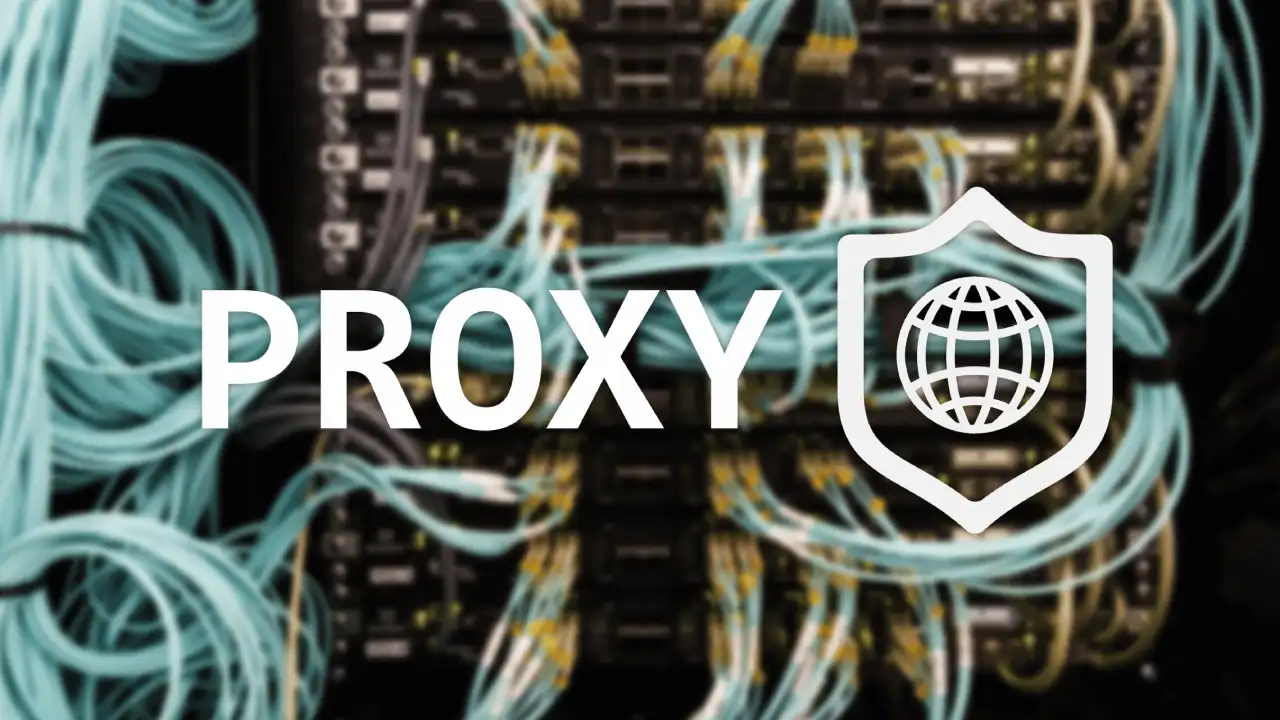
When choosing a proxy service, the price is always a big factor. Let’s compare how much Bright Data and NetNut cost so you can decide which one gives you the best value for your money.
| Feature | Bright Data | NetNut |
|---|---|---|
| Pricing Model | Pay-as-you-go, based on data usage | Subscription plans with clear pricing |
| Residential Proxies | Expensive, based on data volume | More affordable compared to Bright Data |
| Mobile Proxies | Expensive, based on data volume | Affordable, reasonable pricing |
| Datacenter Proxies | More affordable than residential/mobile, but still higher than most competitors | Cheapest among the three proxy types |
| Pricing Flexibility | Flexible, but can get pricey for heavy users | Predictable and easier to manage for smaller budgets |
| Best For | Large-scale projects with flexible needs | Small to medium businesses or those on a budget |
Pros and Cons: Bright Data vs NetNut
Bright Data
Pros:
- Large Proxy Network: Bright Data has many types of proxies, including residential, mobile, and datacenter proxies, so you have plenty of options.
- Global Coverage: It has proxies in many countries, so you can target almost any location.
- Advanced Features: Bright Data offers useful tools like a Proxy Manager and Browser Extension, which makes it easier to use.
- Great for Big Projects: If you need to handle big tasks like web scraping or ad verification, Bright Data can handle it with its large network.
Cons:
- Expensive: Bright Data is pricey, especially for residential and mobile proxies. It may not be the best choice if you’re on a budget.
- Hard to Learn: The platform has many features, which can be confusing for beginners. It might take time to figure out how to use it well.
- Can Be Slow: While mostly reliable, Bright Data can sometimes be slow, especially during busy times or in certain locations.
NetNut
Pros:
- Affordable: NetNut is cheaper than Bright Data, making it a better option for smaller businesses or people on a budget.
- Faster and More Reliable: Thanks to its direct connection to ISPs, NetNut offers faster and more stable speeds than many other services.
- Easy to Use: NetNut’s dashboard and settings are simple, so even beginners can start using it without much trouble.
- Low Latency: NetNut usually has low latency, which means faster connections for things like web scraping.
Cons:
- Smaller Proxy Pool: NetNut has fewer proxies compared to Bright Data, so it might not be the best choice if you need proxies from rare locations.
- Fewer Features: NetNut doesn’t have as many advanced features as Bright Data, which could be a downside if you need more control.
- Less Customization: It’s easier to use, but that means you have fewer options for adjusting the settings to fit your needs.
Which One Should You Choose?
Now that we’ve compared both, let’s keep it simple.
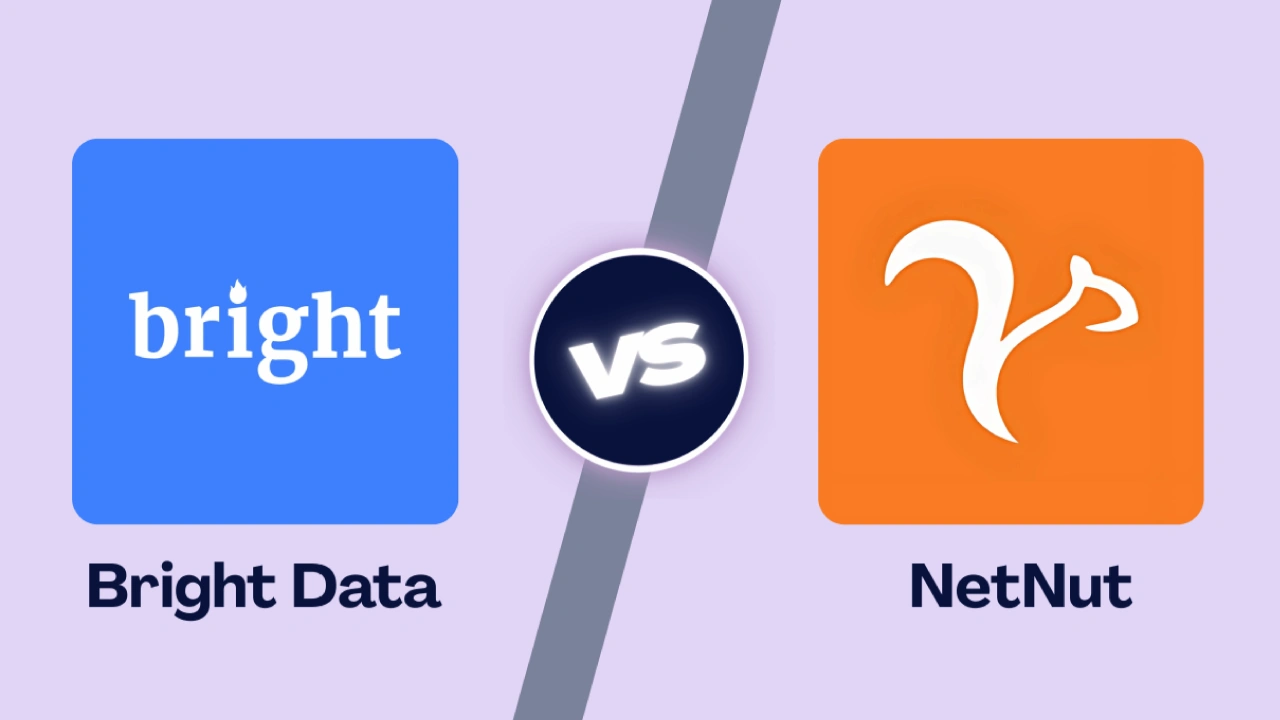
- Go for Bright Data if you need a huge proxy network, advanced features, and can handle a bit of a learning curve. It’s a great option for big projects like large-scale web scraping, ad verification, or market research. Just keep in mind, it’s not the cheapest, and it might take some time to learn.
- Pick NetNut if you want something affordable, fast, and easy to use. It’s perfect for small to medium businesses or anyone who’s just getting started with proxies. While it doesn’t have as many features as Bright Data, it gets the job done well for everyday proxy tasks and smaller scraping projects.
FAQs
Conclusion
Bright Data vs NetNut: Which Proxy Provider Should I opt for?
Bright Data
Bright Data formerly known as Luminati Network is now the world’s number one web data platform. It allows you to retrieve the public web data from data collection infrastructure to ready-made datasets. So far Bright Data has been used for collecting stock market data, travel aggregation, social media marketing, market research, and more.
It offers a comprehensive range of proxies in many cities and countries of the world. Using it is very simple as there is no requirement of coding and it’s just marginally a bit more complicated than a commercial VPN. Bright Data has many advanced features like intelligent routing, SSL decryption, custom rules for reducing bandwidth use, and more.
It has a web unlocker that solves captchas and automatically retries for a better success rate. The data controller is another additional product that fetches hundreds of standard data types including Amazon products, social media profiles, Google search results, and YouTube content using your search terms. It has a search engine crawler that gets you geo-targeted search results for any keyword, on each search engine.
Bright Data also has a Bright Data Proxy Browser extension that is a Chrome add-on and enables you to use your proxies directly from the browser, you can use it much like a VPN: select a country, connect, visit the target sites, run searches and do anything you wish to. In all, it is a huge network that comes with flexible billing options.
Features of Bright Data
Dashboard
Bright Data has a very nice user-friendly dashboard. The dashboard has a bunch of summary information, charts to monitor your proxy later, and a sidebar that has icons for different areas of service zones.
Speed
Speed is a very important factor as it depicts the amount of data that can pass through the proxy and ping the time that is taken for the data to make a trip to the contacting server and back. Bright Data offers a very fast speed.
It’s faster than most of the other proxy servers because the built-in rotation manager of Bright Data is the most efficient. However, the speed also depends upon the type of proxy you are using which means it is not the same for the data-center, mobile or residential proxies.
Support
Bright Data offers a great team that has a solution to almost every problem. They offer one of the best customer support 24 hours a day, 7 days a week.
Pricing of Bright Data
Bright Data has various types of pricing plans for each of its four IP address types: data center, residential, static residential, and mobile. The monthly subscription plans of Bright Data are- Experimenting at $300/month, Starter at $500/month, Production at $1000/month, Plus at $3,000/month, and Enterprise to customize a monthly plan as per your needs.
Why choose Bright Data?
Bright Data has a great infrastructure and it possesses amazing tooling. It is one of the best proxy providers in the market. It has proxy-based APIs, complete data sets, and a no-code web scraper. It is a very flexible, reliable, efficient, and fully compliant platform where new features are released every other day.
Bright Data also has 24/7 global support from a team of experts and gives tailored solutions that meet your data collection goals perfectly. There are about 72+ million IPs available in Bright Data. It has residential, mobile, and data center IP options and flexible pricing options to choose any. It requires no coding skills, provides ready-made and customizable templates, and is very accurate and reliable.
Bright Data is highly powerful and has amazing configurable tools that make it a must-try for users and demanding projects. An advantage of using Bright Data will be you will not have to invest your time any further in collecting the information manually about the websites that you or your customers visit and your business will be improved by using its custom-tailored service.
- Target any country, city, carrier & ASN
- 99.99% uptime which is extremely stable
- 72+ million ethically-sourced IPs
NetNut
NetNut has control over three proxy networks: US Datacenter Proxies, Rotating Residential Proxies, and Static Residential Proxies (ISP). It has an exceptionally different way of offering the residential IPs to the customers, it connects to IPs directly from all across the globe.
It can be said that NetNut is one of the only platforms in the market that is directly connected to ISPs worldwide. It provides cyber and web intelligence companies with residential proxies that allow them to collect data from the web anonymously.
Most of the proxy providers use the P2P (peer-to-peer) networks for sourcing their residential IPs but NetNut with a different company called “DiviNetworks”. This network plays a great role in making NetNut a hit, it provides services to 100 ISPs from tens of PoPs (point of presence) around the world and also manages 100’s Gbit per second of the network traffic and allows any customer to access the data and content from any web source.
In the data delivery network field, this network is the leader. NetNut has dedicated private proxy pools that are fully optimized and based on your targets they make sure the highest success rates at the highest speed. Using NetNut you can manage the IP location that you wish to use and monitor the traffic usage.
In all, like the other proxy providers, NetNut also provides a simple way to manage the proxies with a user-friendly dashboard UI. It is very simple to use and easy to understand.
Features of NetNut
Dashboard
NetNut has an amazing real-time dashboard with updated statistics including the usage per country, total usage, sub-user information, and a number of requests.
Speed
NetNut is the fastest proxy platform in the market. It provides one-hop ISP connectivity without any dependency on the end user as the traffic is not routed through the end user’s device. And this direct ISP connectivity approach brings faster proxy speeds.
Support
NetNut has a very dedicated account manager that provides the fasted possible support in its residential proxy network. And full integration support is provided along with the remote sessions whenever needed.
Pricing of NetNut
NetNut has packages for pretty much every need. You can get in contact with NetNut’s team members and receive the custom pricing options. Their pricing starts at $300 per month for 30 days and goes up to a request-based enterprise plan at $25,000 per month.
Why choose NetNut?
NetNut is probably the fastest proxy provider in the market. It works intending to provide the best proxy services to every user in the world. It has the capability of handling hundreds of gigabytes per second making sure that you can access any web data content that is geo-targeted. Its residential proxies are very fast and perform well for high volume use. NetNut works the best for those who wish to have proxies at a scale and are experienced. It has an additional peer-to-peer proxy network other than IPs and ISP for increased scalability. And a customer support team is available that is very helpful and supportive. It also gives a money-back guarantee of 7-days so you can also try using it for free.
FAQs
Conclusion
In the above-mentioned proxy networks, we discussed both Bright Data and NetNut briefly. NetNut is one of the fastest residential proxy IP networks present in the market. While Bright Data has the largest proxy service that has a residential proxy network of 72 million IPs all across the world and a proxy management interface for zero coding.
Bright Data can just be a bit complicated to set up and more expensive but it surely is a better choice as it is the world’s leading proxy service that not only provides a very good quality of proxies but also gives an extremely supportive and strong customer support, with a user-friendly and easy-to-use dashboard. It is a company that has evolved much stronger than any of its competitors and become a very popular choice among its users.

